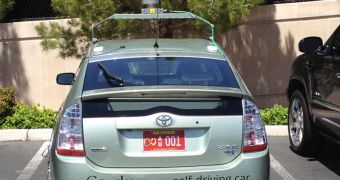Google's self-driving cars may have gotten the company plenty of attention, but they're still nothing more than a hobby. Google has no plans to bring the technology to any car in the short-term future, if only because Google doesn't make cars, at least not yet.
But that's not the only hurdle, an even bigger one is regulations. Particularly when it comes to cars, governments tend to have some strict rules and regulations on just what you can do to a car. And most tend to assume someone, i.e. a person, is driving.
Granted, in the US, you can fuse a helicopter fuselage to a bus chassis, slap some number plates and indicators on it, call it a car and drive it around without too much fuss.
That may or may not be related to a new set of guidelines by the US Department of Transportation's National Highway Traffic Safety Administration which encourage state regulators to not only allow self-driving cars on their roads, but to create legislation that would ensure safe testing.
Currently, several states allow self-driving cars to be tested. Google has made the most headlines with its fleet of Priuses, but traditional car manufacturers are experimenting with the idea as well. These cars can be legally driven (or not driven, actually) in California, Nevada and Florida.
The new guidelines define several levels of automation, from Level 0 that means no automation at all, the (human) drive does everything, to Level 4 – fully automated cars in which passengers only have to input the destination.
In fact, the recommendations even apply to cars with no human passengers on board. The NHTSA believes that automated cars would lead to a decrease in accidents, which is why it's encouraging their research.
Of course, state legislative bodies don't have to comply with the federal recommendations, it will probably be a while before all states do, but it is encouraging that the government, for once, is pushing for innovation and not against it.

 14 DAY TRIAL //
14 DAY TRIAL //